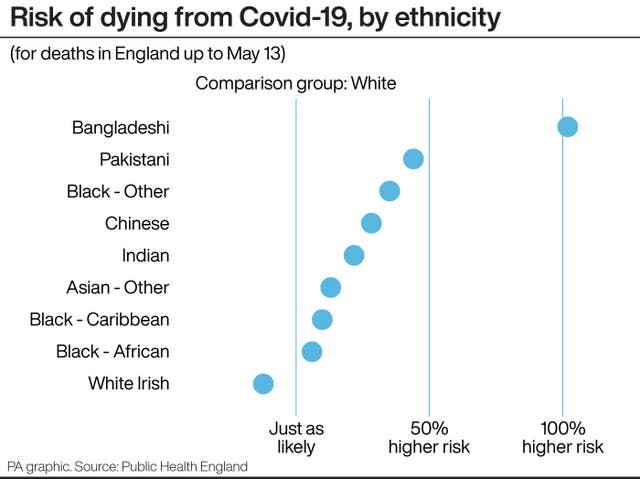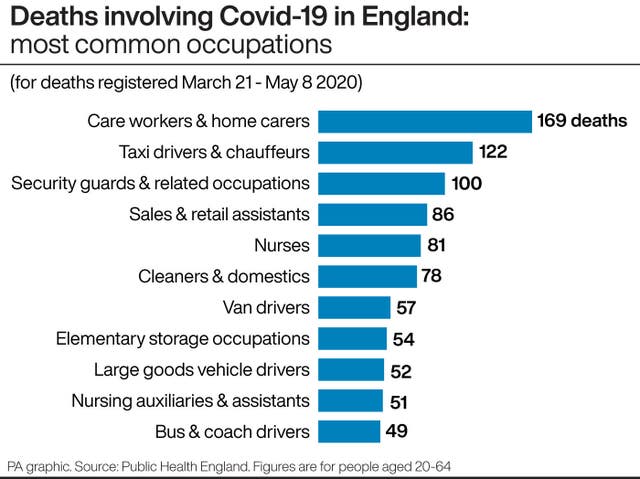Health Secretary Matt Hancock has insisted “black lives matter” as he published a new review which found black, Asian and minority ethnic (BAME) people are at significantly higher risk of dying from Covid-19.
The study, from Public Health England (PHE), looked at the risk factors for coronavirus and found BAME individuals have a much higher risk of death than white people, as do those from poorer backgrounds, men and anyone who is obese or suffering from diabetes.
Mr Hancock said the evidence showed that coronavirus targets people in an “unequal and disproportionate way” and promised further work to find out how much of the disproportionate number of deaths among BAME communities was down to factors like their occupation, housing or other issues.
Conservative MP Kemi Badenoch will be leading the next phase of the research, he said.
Mr Hancock told the Commons earlier: “Black lives matter, as do those of the poorest areas of our country which have worse health outcomes and we need to make sure all of these considerations are taken into account, and action is taken to level-up the health outcomes of people across this country.
“Because there’s no more important levelling-up than the levelling-up of your life expectancy and the quality of health with which you live that life.”
Mr Hancock said the Covid-19 epidemic had shown “huge disparities” across the nation.
“People are understandably angry about injustices and as Health Secretary I feel a deep responsibility because this pandemic has exposed huge disparities in the health of our nation,” he said.
“This work underlines that being black or from a minority ethnic background is a major risk factor.
“This racial disparity holds even after accounting for the effect of age, deprivation, region and sex.”
The PHE report showed that, after accounting for the effect of sex, age, deprivation and region, people of Bangladeshi ethnicity have around twice the risk of death than people who are white British.
Those of Chinese, Indian, Pakistani, Other Asian, Caribbean and Other Black ethnicity have between a 10% and 50% higher risk of death when compared to white British.
Meanwhile, the highest diagnosis Covid-19 rates per 100,000 population are in black people (486 females and 649 males), and are lowest in white people (220 in females and 224 in males).
Compared to previous years, death from all causes are now almost four times higher than expected among black males, almost three times higher in Asian males and almost two times higher in white males.

Among females, deaths were almost three times higher in black, mixed and other females, and 2.4 times higher in Asian females compared with 1.6 times in white females.
The study said the “relationship between ethnicity and health is complex and likely to be the result of a combination of factors”.
For example, BAME people are likely to be at increased risk of acquiring the infection due to the fact they are more likely to live in urban areas, in overcrowded households, in deprived areas, and have jobs that expose them to higher risk, the study said.
BAME communities are also likely to be at increased risk of poorer outcomes once they contract Covid-19.
The study said some of this is due to underlying health issues, with people of Bangladeshi and Pakistani background having higher rates of cardiovascular disease than people who are white British.
Black Caribbean and Black African people also have higher rates of blood pressure, while Type 2 diabetes, which has obesity as its main driver, is more common in BAME individuals.
Professor John Newton, the Government’s testing co-ordinator, urged people not to jump to conclusions about the report.
While coronavirus outcomes are worse for people from black, Asian and minority ethnic people, more work is needed to find out why, he said.
“It is not necessarily because of their ethnicity, it may be related to their occupation or other reasons why they might be at higher levels of exposure,” he told the Downing Street press conference.
Meanwhile:
– MPs defeated an amendment to restore remote voting in the House of Commons during the Covid-19 pandemic by 185 votes to 242. MPs later approved the Government’s motion to only allow them to vote in person by 261 votes to 163.
– The Government believes the two-metre social distancing rule should remain in place, Number 10 has said, as the UK death toll passed 49,800.
– The UK’s statistics watchdog has criticised the Government over its handling of coronavirus testing data, saying the presentation of figures appeared to be aimed at showing “the largest possible number of tests, even at the expense of understanding”.
– Professor Neil Ferguson, who quit as a Government adviser last month, said the UK’s high death rate was partly due to the fact the country’s epidemic actually began much earlier than scientists had predicted.
The PHE study also found that men working as security guards, taxi drivers and chauffeurs, bus and coach drivers, chefs, sales and retail assistants, lower skilled workers in construction and processing plants, and men and women working in social care, had significantly high rates of death from Covid-19.

Men of working age are also twice as likely to die as women, while when compared with those under 40, those who are 80 or older are 70 times more likely to die.
Compared with people under 40, the probability of death is about three times higher among those aged 40 to 49, nine times higher among those aged 50 to 59, 27 times higher among those aged 60 to 69 and 50 times higher among those aged 70 to 79.
Obesity and conditions such as Type 2 diabetes also increase the risk of dying from Covid-19, regardless of ethnicity.
PHE cited one study which included data from 17 million adults showing that, compared to those who are not obese, obese people are 27% more likely to die, rising to almost two-and-a-half times if they are morbidly obese.





Comments: Our rules
We want our comments to be a lively and valuable part of our community - a place where readers can debate and engage with the most important local issues. The ability to comment on our stories is a privilege, not a right, however, and that privilege may be withdrawn if it is abused or misused.
Please report any comments that break our rules.
Read the rules here